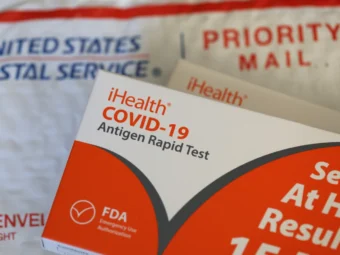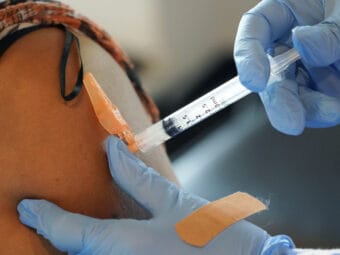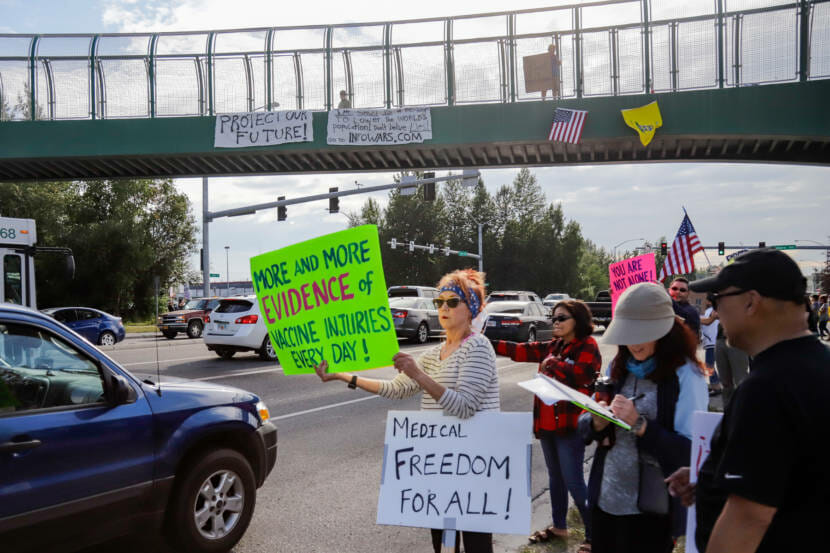
About 150 people gathered at an intersection near the Alaska Native Medical Campus in Anchorage Thursday evening to protest COVID-19 vaccine requirements for employees.
Alaska Native Tribal Health Consortium, along with its partner organization, Southcentral Foundation, announced last month that employees would be required to get vaccinated against COVID by Oct. 15.
Employees and other community members gathered on the corner of Elmore and Tudor roads to protest the mandate. They held signs with messages like “My body, my choice,” “Coercion is not a Native value,” and “Not Anti-vax; Anti Mandate” as passing cars honked their horns.
Event organizer Becky Crawford, who works for Southcentral Foundation as a graphic designer, said she was disappointed that the vaccine, which was authorized late in 2020, is being forced on employees. But she was excited to see a strong turnout.
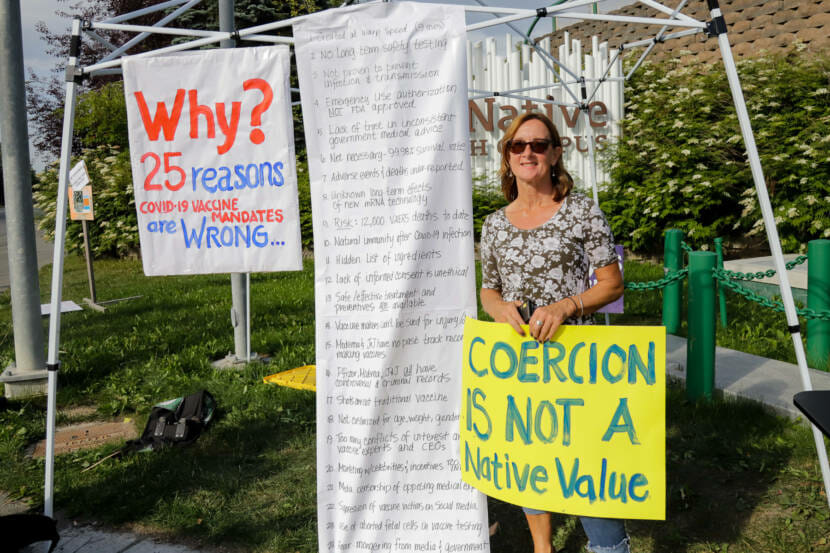
“I’m really surprised,” she said, “It just shows that the community is not okay with these mandates.”
The vaccine underwent rigorous testing and has been proven to be safe and effective.
The Pfizer, Moderna, and Johnson & Johnson vaccines are fully authorized under the Food and Drug Administration’s Emergency Use Authorization, but if the pandemic ends, they will have to be authorized for normal use, which could take several years.
Several other large health care organizations require COVID-19 vaccines. Southeast Alaska Regional Health Consortium announced a requirement in May and Bering Straits Native Corporation required them in April. PeaceHealth, the Catholic nonprofit based in Vancouver, which operates clinics in Alaska and the Pacific Northwest, said it would require vaccines this week. Providence Health & Services Alaska also recently announced a vaccine requirement.
Crawford and others said they don’t trust mainstream medical organizations’ or the governments’ endorsement of the vaccine.
“If they can scare people to get the vax — you know what? They’re making a lot of money,” said Diane Shrader, a protester.
Many attendees of the event expressed worry about long-term effects of the vaccine.
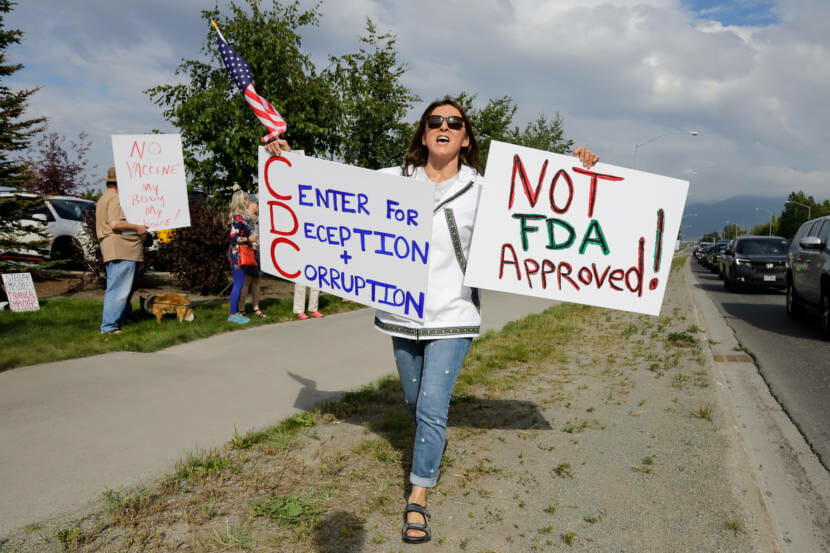
“They say that it’s followed rigorous testing and all that, but you can’t test long-term side effects over a certain period of time. It’s just impossible,” said Matt Lindberg, another protester. “So it doesn’t make any sense to me.”
The mRNA vaccines that are used for the Pfizer and Moderna shots were developed over decades, but the COVID-19 vaccines started being developed at the beginning of 2020.
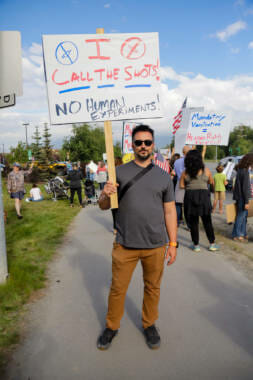
Lindberg didn’t say whether he would eventually get the vaccine, but several others — some of whom declined to share their names — said they would be willing to give up their jobs rather than get the shots.
Employees face an uphill battle in the courts, which have found vaccine mandates for health care workers to be legal. But Crawford said that she hopes the demonstration inspires workers to push back against the requirement.
“I want them to be encouraged that they’re not alone. That was my number one goal,” she said. “And then just to let decision-makers know that this is wrong.”
In a written statement, ANTHC President Valerie Nurr’araaluk Davidson stood by the organization’s decision to require vaccines. The organization has about 3,000 employees, according to its website.
“While we respect the rights of those who chose to demonstrate yesterday and thank them for doing so respectfully, we are committed to providing a vaccinated workforce to protect our patients, staff, and our communities,” said the statement.
She said the decision to require the vaccine was not made lightly, but with staff traveling around the state, it was necessary to keep staff and clients safe.
“We also understand some may make a personal choice to remain unprotected and work elsewhere,” said the statement.
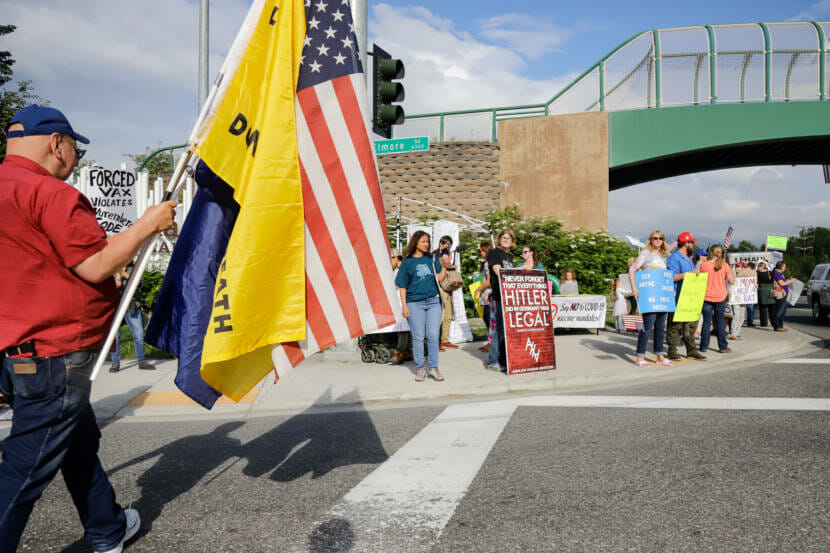
Southcentral Foundation President April Kyle echoed that statement.
“We acknowledge the importance of this decision and did not make it lightly. The vaccines have proved to be safe and effective against infections, hospitalizations, and death. We value and respect all of our employees and recognize that choosing whether to get vaccinated is a personal decision,” she wrote.

